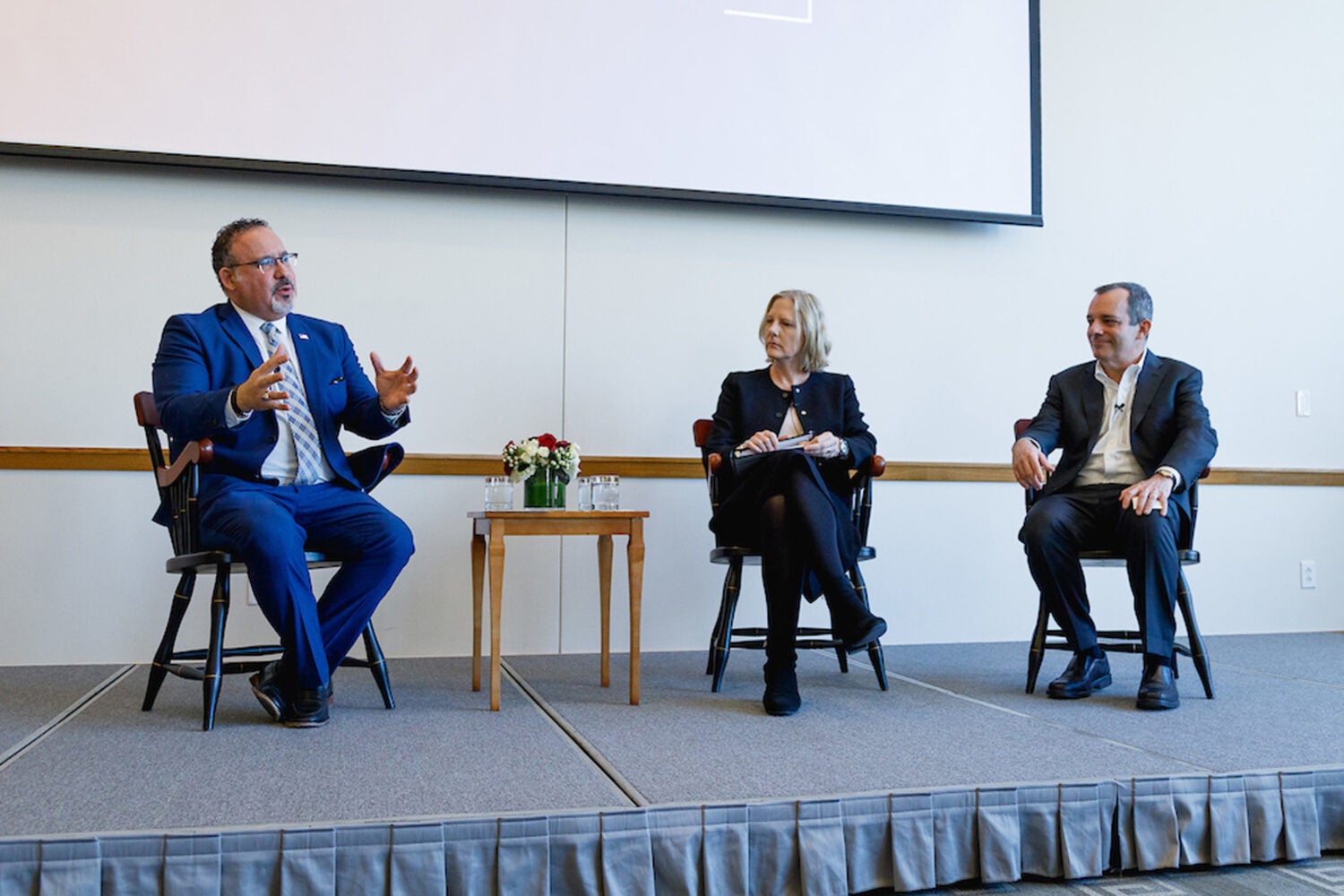“It’s time to stop worshipping at the false altar of U.S. News and World Report,” said U.S. Secretary of Education Miguel Cardona at a conference held at Harvard Law School yesterday. “It’s time to focus on what truly matters: delivering value and upward mobility.”
Cardona was speaking at the Conference on Best Practices for Law School Data, which was co-hosted by Harvard and Yale Law Schools, and included representatives of more than 100 law schools around the country. The discussions focused on best practices in sharing law school data following some schools’ decision to decline continued participation in the U.S. News & World Report rankings, a move Cardona called a “monumental step forward.” As of today, more than 40 law schools across the country have indicated that they would no longer participate in the rankings.
“It was a turning point around what we’re trying to do together to improve access and equity in our higher education institutions,” he said. “I’m here today because of that courageous leadership — because of those decisions.”
The event aimed to rethink the data that is important to prospective students and how to share that data so that they can make the best educational choices for themselves. In announcing Harvard Law’s withdrawal from the rankings in November, John F. Manning ’85, the Morgan and Helen Chu Dean and Professor of Law at Harvard, cited concerns about aspects of the organization’s methodology that work against the school’s “commitments to enhancing the socioeconomic diversity of our classes; to allocating financial aid to students based on need; and, through loan repayment and public interest fellowships, to supporting graduates interested in careers serving the public interest.”
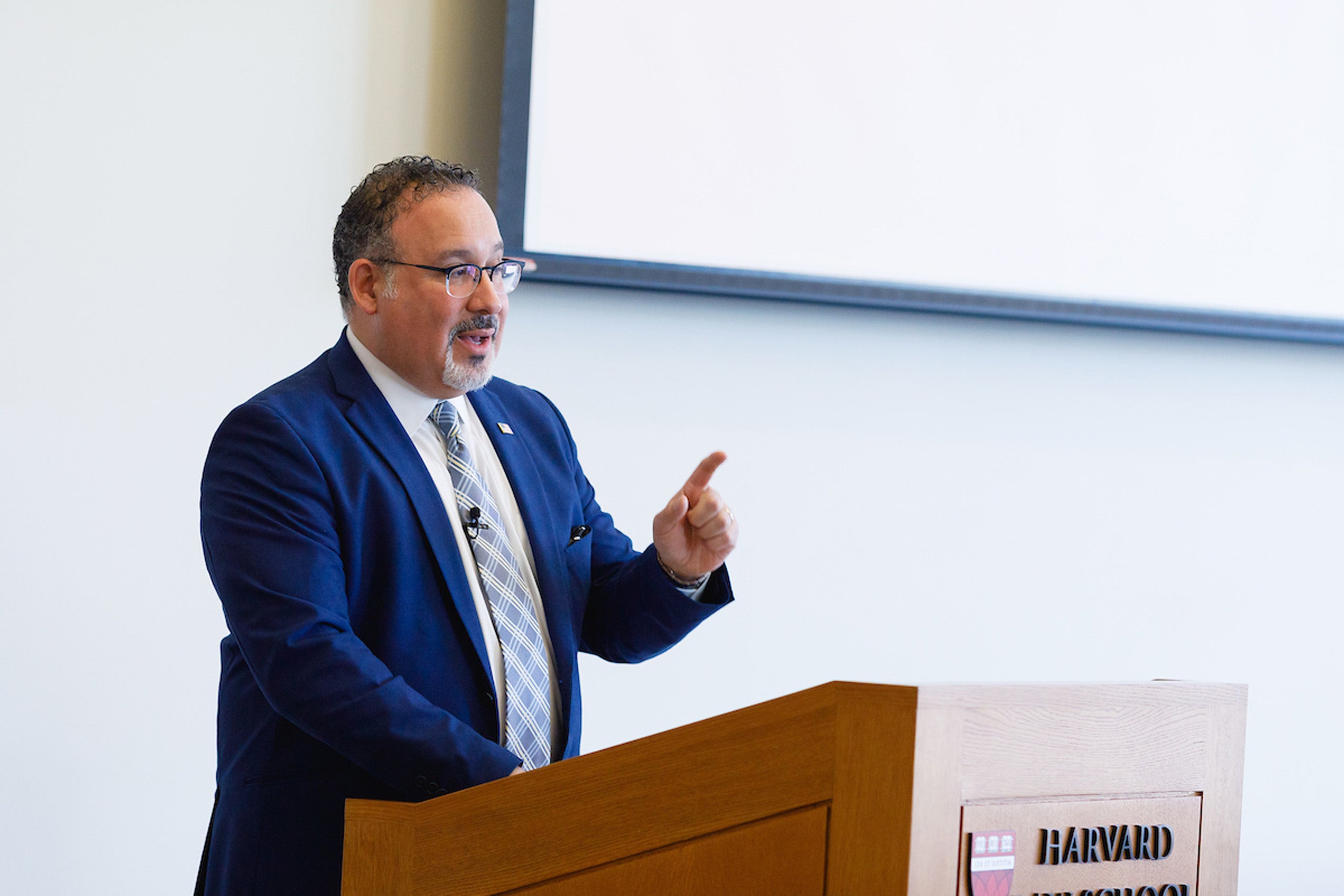
Manning opened the conference by thanking the day’s panelists and participants. “I feel very grateful to work in legal education, where we have the opportunity to explore and help address some of society’s most pressing issues, and to teach students who will take their place in a profession that is, at its core, dedicated to equal justice, due process, constitutional democracy, and the rule of law.”
He added that he hoped the conference would consider how best to help prospective students answer two fundamental questions. “One is, is the law the right profession for me? And the second is, if so, which law school would best fit my needs and aspirations?”
Yale Law School Dean and Sol & Lillian Goldman Professor of Law Heather Gerken said in her opening remarks: “Today we come together to figure out not just how to make choosing a law school easier and more transparent for prospective students, but to refocus the conversation on the values of the profession and the future of legal education.”
In his keynote address, Cardona praised the schools’ desire not only to discuss the problems with the rankings, but also their commitment to thinking about “what comes next,” he said. “It’s not enough to abandon a broken system. The real work is building a better one for everyone. And you’re taking the lead on that.”
In response to a question from Manning about whether schools should be thinking about some means for measuring the ways in which institutions enable their students to serve and to promote the public good, Cardona was emphatic. Among other approaches, the secretary said he wants schools to “measure your success based on the number of students that are solving the world’s problems.”
Framing the issue
The first panel of the day focused on outlining the problems with reliance on the rankings and the perverse incentives such reliance can cause. Tamara Lawson, dean of the University of Washington School of Law, began by pushing back on the claim that without rankings produced by a for-profit company, law schools would not be transparent with providing information to the public.
“The American Bar Association actively holds every law school accountable on criteria and data that is publicly available and transparent,” she said, referring to a wealth of information about the schools that is hosted on the ABA website. “And what does that mean to be actively held accountable? It includes that the ABA goes to every law school, it talks to law students, it talks to law graduates, it talks to law faculty, it sits in on classes, and observes and inspects the law school facilities and the law library collections. All of that is done by experts in the field, and there is no way to game that type of accountability. The outdated ranking systems do not have that.”
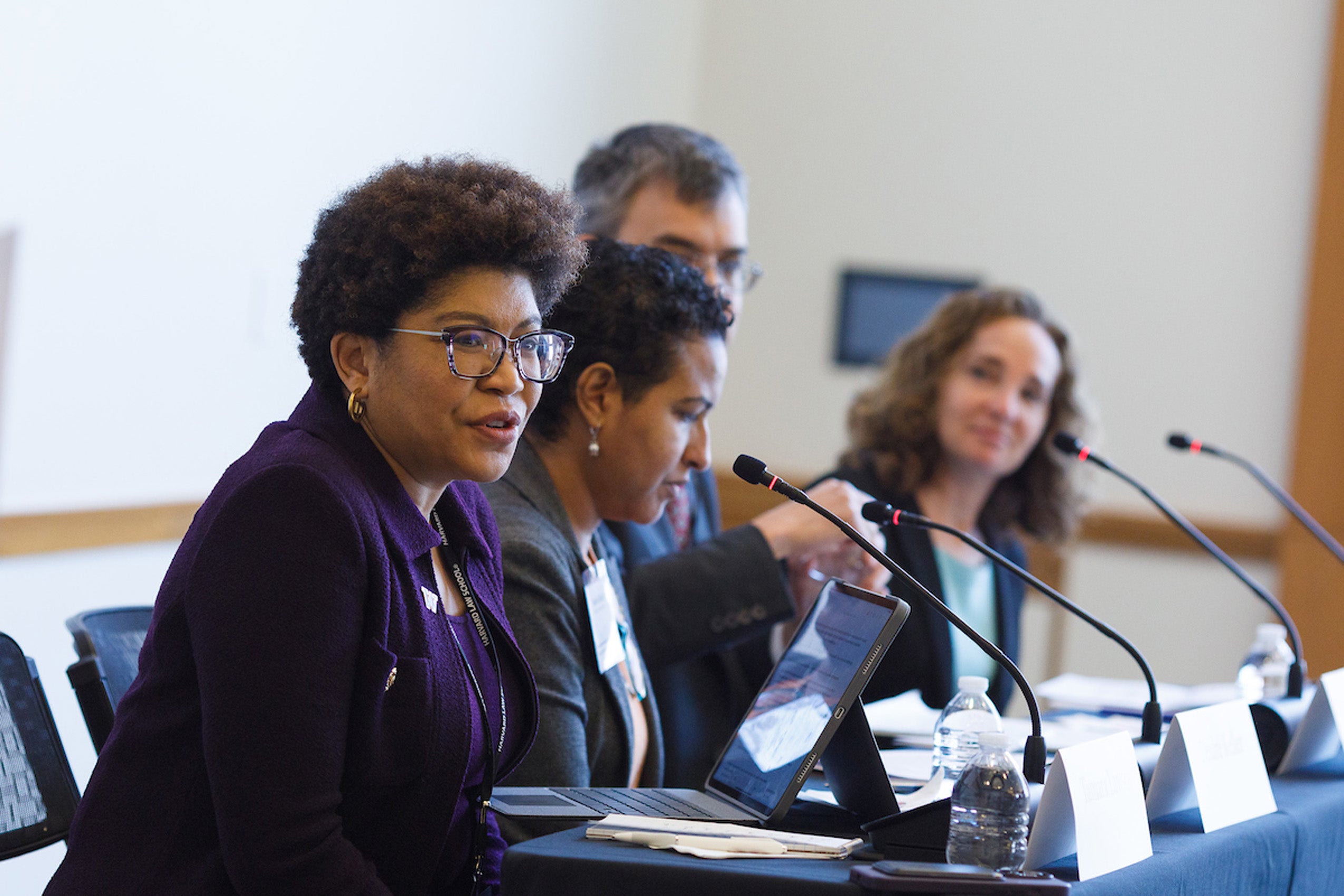
Deidré Keller, dean of Florida A&M University College of Law, said that maintaining or improving in the rankings can cost schools a lot of money, that could be better spent to support students or on other initiatives. She also questioned the rankings’ methodology. “I really have to wonder whether they measure what matters,” she said, adding that focusing on selectivity alone would be incongruous with her school’s mission as an access institution. “I would suggest that there are much more important things to measure, one of which is the value add. What does a student get in terms of support from an institution that is going to carry the student who may not be successful somewhere else across the threshold and into the profession?”
Panelist Christopher Norio Avery, a professor of public policy at Harvard Kennedy School, agreed with his fellow panelists, but included a note of caution. “It’s obvious that the law school rankings have pernicious effects. They’re conveying the wrong messages to students, providing the wrong incentives to the law schools about what to prioritize,” he said. But institutions should think deeply about alternatives, to avoid “remov[ing] one bad system and replac[ing] it with another system that may be bad in a wide variety of other ways.”
Investigating student needs
A second panel invited advising leaders from colleges around the country to discuss the types of data and information students look for in deciding when and where to go to law school, and the trends they are seeing in their pre-law programs.
In discussing which data students consider in their law school search, Erin Reichelt, associate director for pre-law services at the University of Minnesota, said that some of her students apply to upwards of 15 and 20 law schools and have to wade through a lot of information to make their decision. She said that many still use the rankings. “They’re relying on them as a kind of gospel,” she said, before adding, “The methodology for all of these ranking systems is very opaque to the typical applicant. They don’t understand what is going into the ranking, but they are trusting that it’s legitimate, unless they are told otherwise by someone who is in the know, which not everyone has access to.”
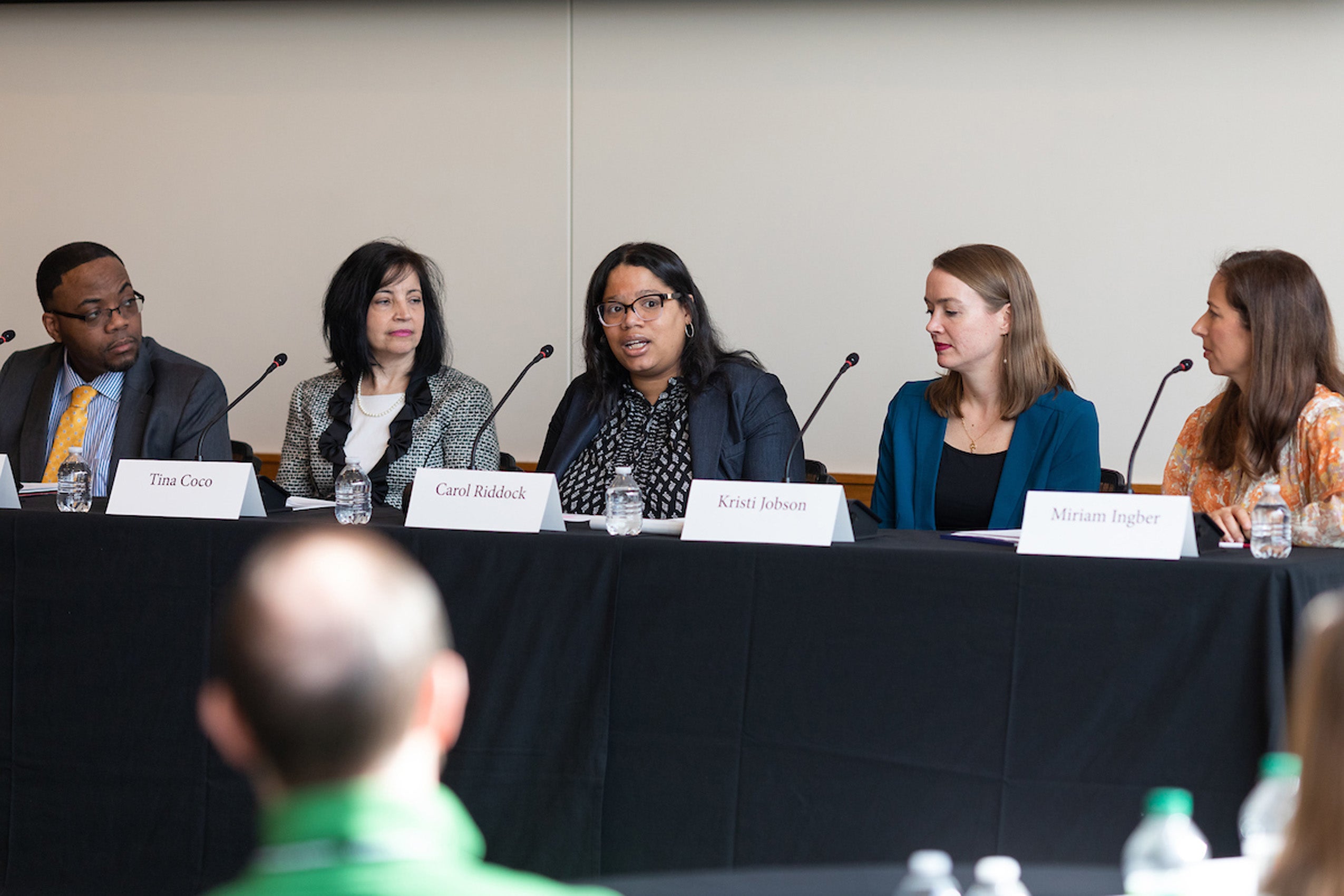
Carol Riddock, director of pre-law advising at Emory University, said that her students also appreciate access to data, including the ABA’s 509 reports, but that parsing the information can be difficult. “I think students do see the value of data, [but] navigating it and finding it sometimes can be a little tricky for them,” she said. Riddock suggested that 509 reports be made more visual and easily digestible, and that schools place their class profiles “front and center” for more more visibility.
Tina Coco, pre-law advisor and manager of the Max Berger Pre-Law Program at Baruch College – CUNY mentioned that one of her goals is to help prospective students understand that it’s not just about test scores. She urges students not take themselves out of consideration for certain law schools, adding that predictor tools available on the internet are not always accurate, because the data “are based on previous applicants, nothing is guaranteed.” The students, she concluded, “need to create a well-rounded application for themselves that includes internship experiences, leadership experience, and so forth.”
And Julian Miller, an assistant professor of political science and director of the Reuben V. Anderson Pre-Law Program at Tougaloo College, noted a commonality among many prospective law students he advises. “One trend is a commitment to social justice and believing in the value of the law and making society better,” he said. Miller also emphasized the importance of advisors and mentors in helping guide students through choosing and applying to law schools. “All of our students have lawyer-mentors that help this process of tracking them and making sure” they get where they want to go, he added.
Looking forward
The day’s third and final panel focused on how law schools can work together to, as several panelists described it, to give prospective law students the information they need in an accessible format.
Moderator Catharine Bond Hill, the managing director of Ithaka S+R, which is part of ITHAKA, a not-for-profit organization helping the academic community use digital technologies, opened the discussion by saying that, while for-profit rankings companies are unlikely to disappear, she hoped panelists could “find something that’s perceived to be better than U.S. News and World Report’s on the part of those who use it so that … students [get] the information that they need. But I hope that it also supports deans and schools as they work to serve their missions and contribute to the public good as well.”
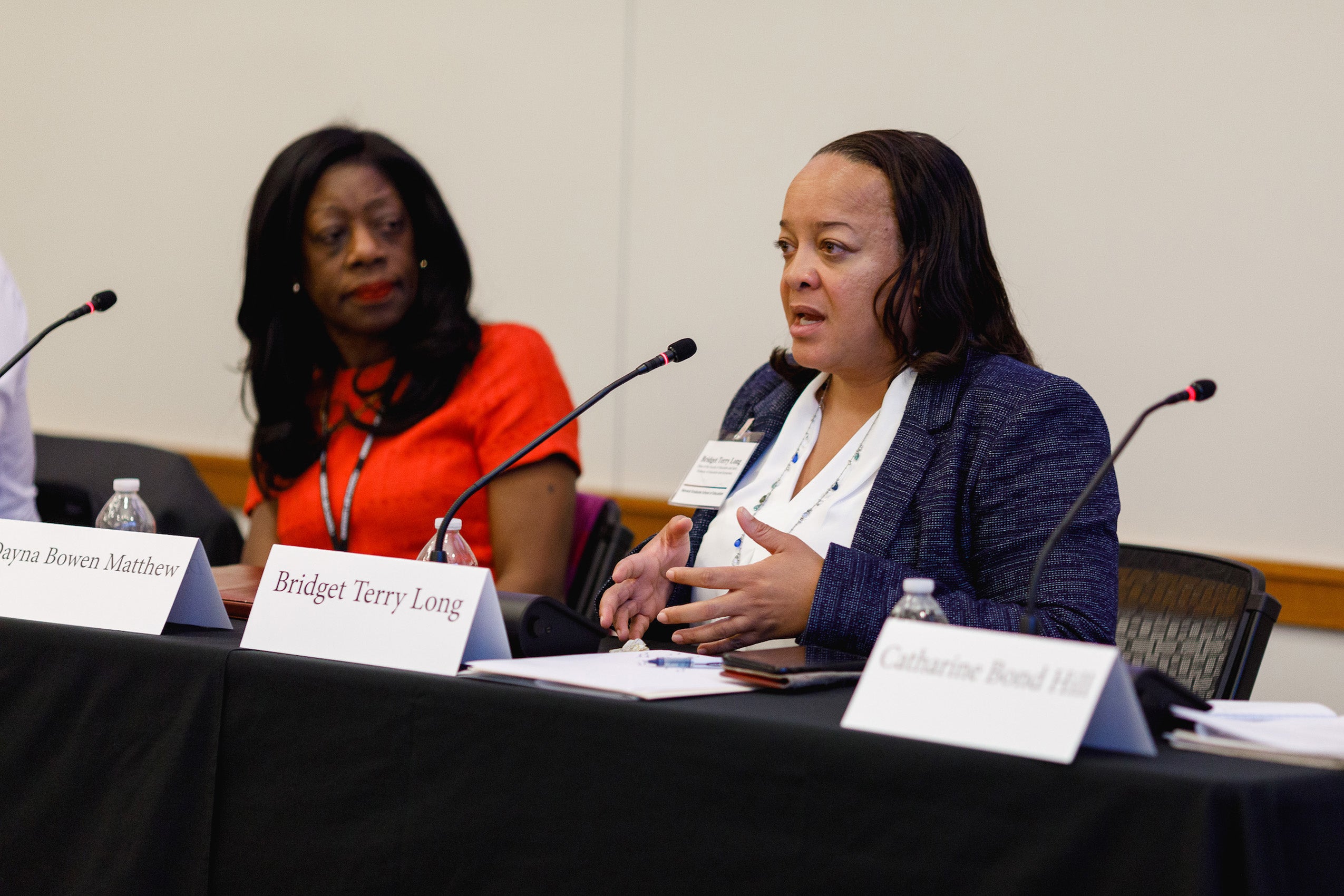
Bridget Terry Long, dean of the Harvard Graduate School of Education, noted that researchers have been studying the effectiveness of rankings for decades, adding that, “we’re not starting with a blank piece of paper, there’s been some lessons that have been learned.” Assessing outcomes, including income and job placement, as well as factors like social mobility and community service contributions, will be key, she said, to get at the question of “whether students are actually doing well.” Helping students find the right match is another important objective, she said. “When you’re trying to get to differentiating between high quality A and high quality B, it really becomes more of a challenge of, ‘Well, which one’s the better match, given the specific things I want to do?’”
George Washington University Law School Dean Dayna Bowen Matthew said that a discussion of what data schools want to provide must start with an examination of the values that law schools are trying to uphold. “What really is best for legal education? And what are our underlying core commitments?” she asked. “Are we really asking the right questions … Should we be thinking about the underlying commitment that we want to serve, and then after that, determine what the measure is?” As a guidepost for answering these questions, Matthew referred to a 2003 law review article written by the late Harvard Law Professor Lani Guinier titled, “Admissions Rituals as Political Acts: Guardians at the Gates of Our Democratic Ideals.” Matthew credited Guinier with the idea that campus communities are “the principal golden guardians of our traditional opportunitarian ideals … We really are sitting in some respects as guardians of the gates of democracy.”
Peter B. “Bo” Rutledge, dean of the University of Georgia School of Law, said that constraining the rising costs of higher education would be key to preserving a wide range of career opportunities for law students. He also agreed with fellow deans that law schools’ approaches to data sharing, as well as policy-setting, should be driven by institutional values, rather than incentivized by outside forces. “Whatever one thinks about this system,” he said. “I reject the proposition that an academic leader needs to say ‘U.S. News made me do it.’” He added, “You’ve got to make a decision as an academic leader about what the organizational values are of your institution, and whether and to what extent they will align or will not with U.S. News.”
Sudha Setty, dean of the City University of New York School of Law, echoed Dean Matthew’s emphasis on the need to focus on the goals of legal education. She highlighted the context in which law schools are operating today and underscored society’s need for more lawyers to address “unmet legal needs everywhere” and the growing public awareness that “lawyers can be the vehicle for social justice in a way that they might not have realized a few years ago.”
“We are the vehicles of folks who are leaders, who are protectors of democracy,” Setty said, adding, “ And I view that as an opportunity to really think about what we are trying to do to broaden legal education, what kind of information we want to share, how we want to share it, to reach more people, and to encourage more people who are traditionally underrepresented in law school to come in and help us be part of the solution,” which includes defending democratic values.
In conclusion
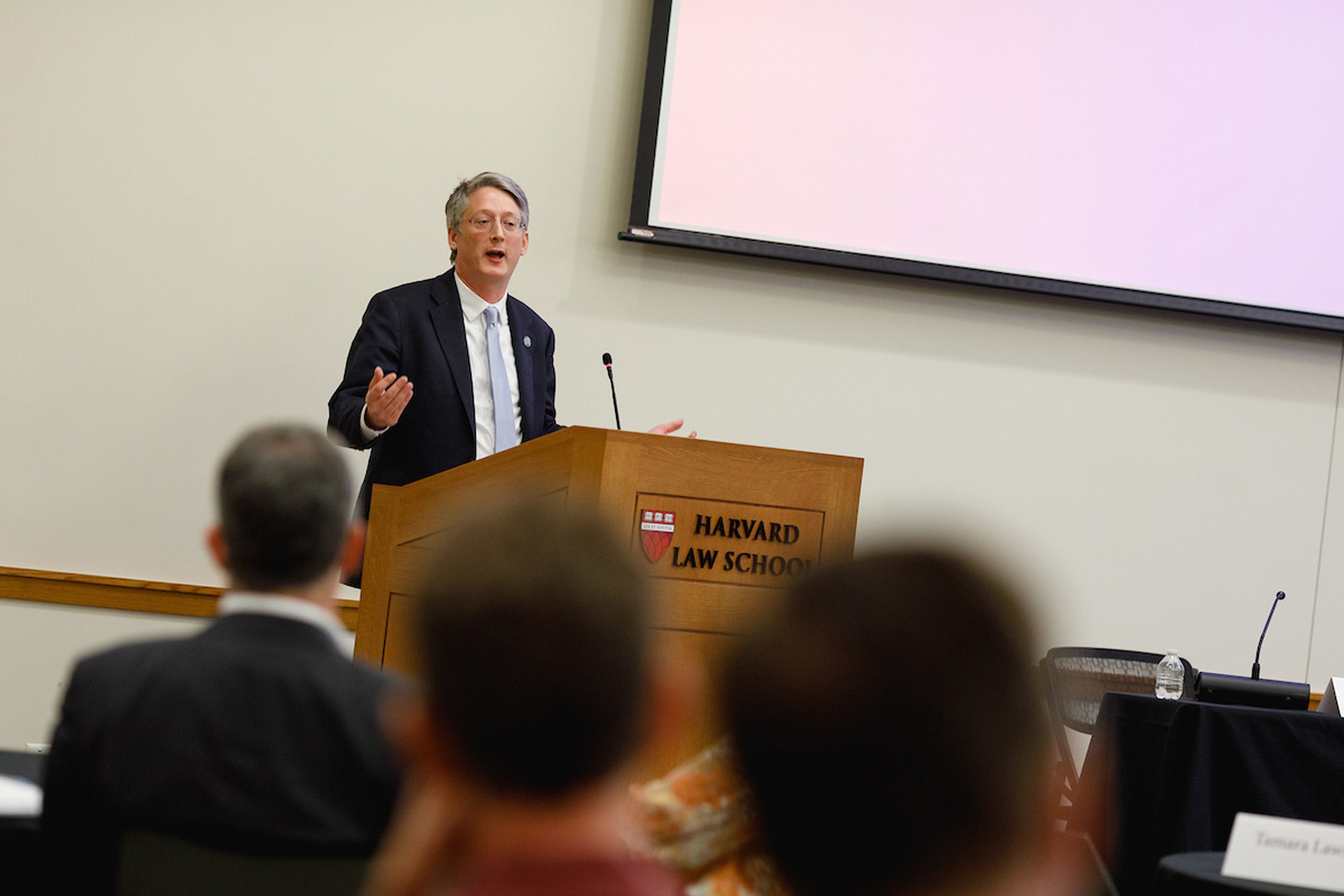
In his concluding remarks, U.S. Under Secretary of Education James Kvaal ’07 shared efforts being made by the Biden administration to tackle many challenges facing higher education generally, including affordability, student debt, and graduation rates. He added that legacy rankings are in some ways “distorting our efforts to try and build a system that is more affordable and more inclusive.”
“The U.S. News rankings epitomize a value system that rewards selectivity,” Kvaal said, adding that they too narrowly define the idea of educational excellence. “So, if you are a law school committed to the mission of enrolling students who might not otherwise have the opportunity, or producing people who are committed to public service, you suffer in those rankings. And you have to bear the costs of explaining to your boards, your state legislatures, your alumni, why your mission is not captured by U.S. News.”
Kvaal told the assembled law school deans and administrators from across the country that “the leadership of Dean Manning, Dean Gerken, and all of you who have followed in their footsteps so incredibly quickly shows how quickly we can change what we think is quality in higher education.”
Want to stay up to date with Harvard Law Today? Sign up for our weekly newsletter.
